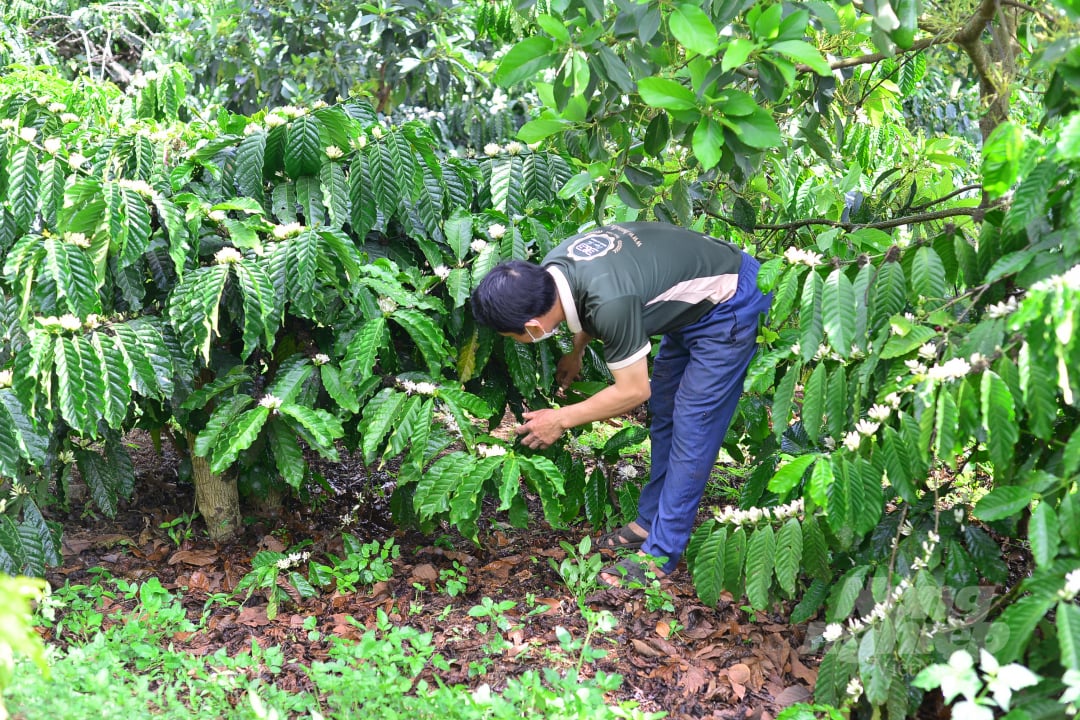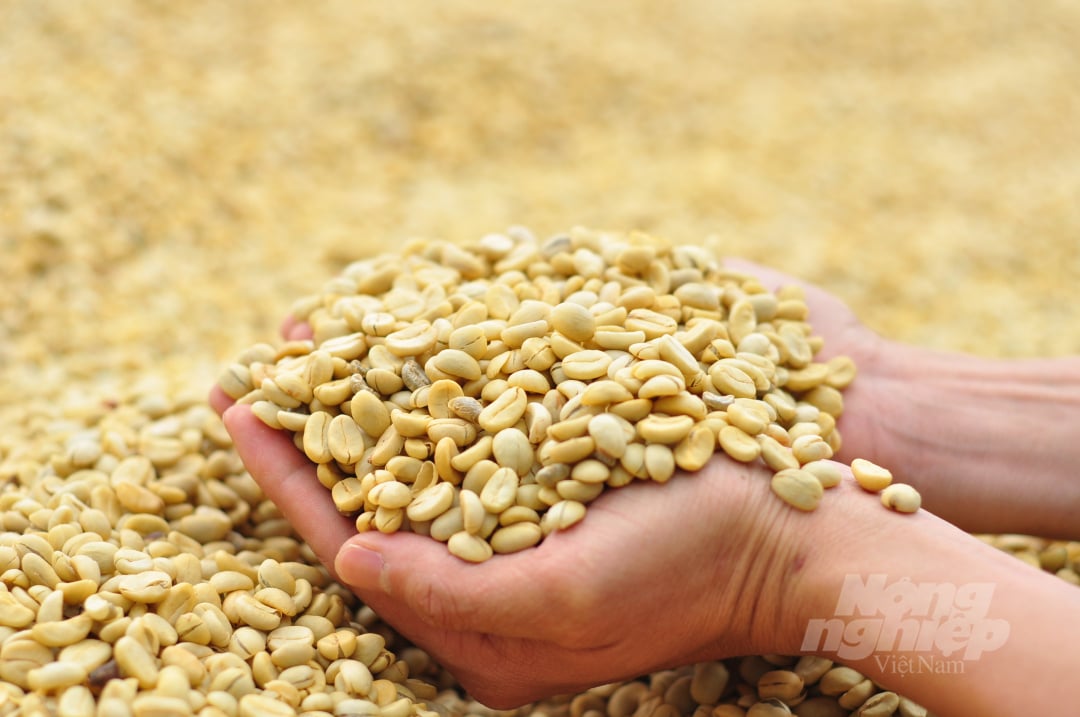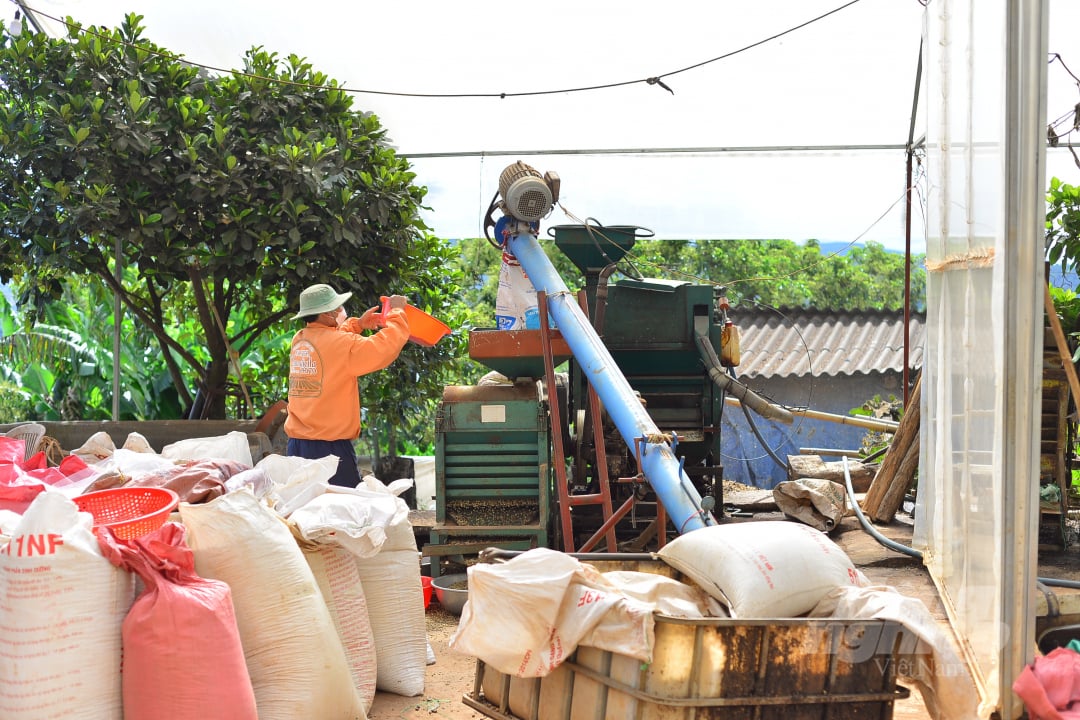May 24, 2025 | 16:20 GMT +7
May 24, 2025 | 16:20 GMT +7
Hotline: 0913.378.918
May 24, 2025 | 16:20 GMT +7
Hotline: 0913.378.918
In 2017, Mr. Tran Van Xuat, a local in Nam Ban Town, Lam Ha District, Lam Dong Province called for the establishment of the Chi Lang - Dong Anh coffee production group. By 2019, with the support of the VnSAT project, the group developed stably and developed into Nam Ban Agricultural Cooperative (NBAC).
The Cooperative now has about 24 members farming on an area of about 50ha of coffee integrated with avocado. The entire area is being developed under a high-quality model and has obtained UTZ certification.
According to Mr. Xuat who is now Director of the NBAC, in the past, his family and other coffee households in the area followed traditional production methods and sold products to traders or purchasing outlets in the region.

Currently, the coffee gardens of Nam Ban Agricultural Cooperative’s members have achieved UTZ certification. Photo: Minh Hau.
"In the past, as we kept using chemical fertilizers and pesticides, the soil in the garden began to arid, and the plants also became poor quality in growth. It was until we get technical training supports of VnSAT's project, we know and switch to clean coffee production," Xuat revealed.
According to Mr. Xuat, currently, NBAC members are applying clean production processes to limit the use of chemical fertilizers and toxic pesticides to protect human health and the environment. The grass in coffee gardens is maintained following an organic agricultural model to create the microflora that can contribute to improving the soil’s quality, moisture, and humus and boost plants’ growth.
To increase production value, the NBAC members are also intercropping different high-yield avocado varieties such as the 034, Hass, and Pinkerton. These plants both create canopy and shade for coffee and help growers raise their income. "Particularly for avocado, each crop can give a yield of about 100kg of fruit per plant. For some years, a household even can annually harvest 15 tons of fruit/crop," said Mr. Xuat.

With support from the VnSAT Project, each year, Nam Ban Agricultural Cooperative can produce about 100 tons of high-standard green coffee and 150 tons of common coffee beans. Photo: Minh Hau.
For coffee, after harvesting 100% ripe fruit, farmers move on to the processing stages. The fruits will be selected before putting into a soaking tank, washed, and then put on a scrubbing machine. The coffee beans which are selected for producing honey coffee will be put into a greenhouse to dry…
Mr. Xuat also said with the support of the VnSAT Project, each year, the NBAC can produce about 100 tons of high-standard green coffee and 150 tons of common products. Currently, an enterprise has contracted with the cooperative to purchase about 100 tons/year of high-standard coffee products.
The Cooperative has also signed contracts with its members to purchase fresh coffee at a price higher than the market price.

Nam Ban Agricultural Cooperative has invested in a machinery system to ensure preliminary processing as well as the whole production. Photo: Minh Hau.
To improve production capacity and increase the value of agricultural products, the NBAC in the recent time has invested in building a system of warehouses and greenhouses for drying coffee.
The cooperative also invests in many machines for effective coffee preliminary processing and production. "Currently, along with organizing a linkage in clean coffee production, we are also promoting market expansion to introduce our clean coffee products to foreign countries," said the NBAC director.
Mr. Nguyen Van Chau, Deputy Director of Lam Dong Department of Agriculture and Rural Development, said the Lam Dong VnSAT project has supported 44 farmer organizations in the province's key coffee production areas under the farmer group/cooperative model consisting of about 14,000 farmer households who have been guided to follow a sustainable coffee production process. The project has supported coffee cooperatives and cooperative groups to improve their capacity in processes of operating warehouse systems, drying, and pre-processing. This has also helped them complete their coffee production at the same time improve the product quality.
Over the past time, VnSAT has become a bridge connecting coffee cooperatives with input suppliers, processing and roasting enterprises to form a chain from production to consumption which aims to improve the value chain for coffee products. Through vocational training activities, seminars and communication, models of technical support and investments in infrastructure for farmer organizations have been recognized, widely known and replicated among farmers in districts and communes.
Translated by Linh Nguyen

(VAN) The People's Committee of Tra Vinh province has approved an adjustment to the investment policy for the Green Hydrogen Plant project, increasing its area to approximately 52.76 hectares.
![Reducing emissions from rice fields: [2] Farmers’ commitment to the soil](https://t.ex-cdn.com/nongnghiepmoitruong.vn/608w/files/news/2025/05/05/dsc08881jpg-nongnghiep-140632.jpg)
(VAN) Clean rice cultivation model in Thuong Tan commune, Bac Tan Uyen district, is assisting local residents in achieving sustainable agriculture by substantially reducing costs, increasing productivity, and protecting the environment.

(VAN) At the conference to disseminate Resolution No. 68, AgriS introduced its digital agricultural ecosystem and reaffirmed its commitment to accompanying the Government in promoting private sector development and sustainable agriculture.

(VAN) 'Blue Ocean - Blue Foods' initiative is designed to restore marine ecosystems and establish sustainable livelihoods for local communities by cultivating a minimum of 1,000 hectares of cottonii seaweed in the first three years.
/2025/05/21/4642-3-112707_603.jpg)
(VAN) The V-SCOPE project has made direct contributions to three out of six pillars of the Comprehensive Strategic Partnership between Vietnam and Australia.

(VAN) Facing the threat of rabies spreading to the community, Gia Lai province urgently carries out measures to vaccinate dogs and cats on a large scale.

(VAN) Disease-free livestock farming not only protects livestock herds but also stabilizes production and livelihoods for many farmers in Tuyen Quang.